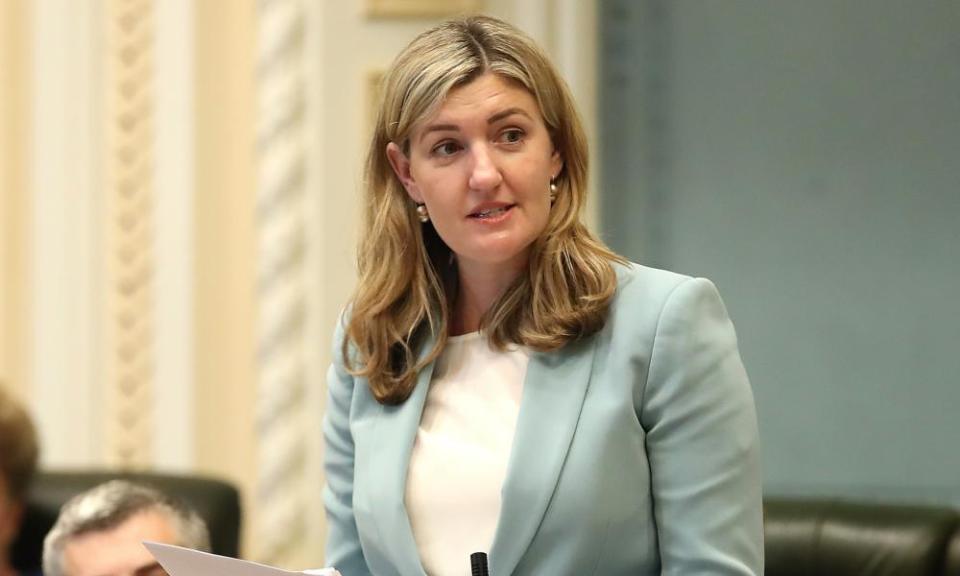Coercive control should be criminalised in Queensland, taskforce says

The Queensland government will “extensively consider” the recommendations of a women’s safety taskforce, which has called for the criminalisation of coercive control and an inquiry into “widespread cultural issues” within the state’s police service.
The taskforce, led by the former court of appeal president Margaret McMurdo, handed its report to the Queensland attorney general, Shannon Fentiman, on Thursday.
The McMurdo report proposes a staged path to criminalising coercive control that would take at least three years. The offence would be subject to a maximum prison term of 14 years.
While the taskforce praised the leadership of the Queensland police service, it also recommended an independent commission of inquiry “to examine widespread cultural issues within the Queensland Police Service”, including whether the state required an independent law enforcement conduct commission.
Related: Queensland police consider bringing social workers to domestic violence incidents
Guardian Australia has reported extensively on policing failures related to domestic violence victims in Queensland. Women’s groups have called for such an inquiry into officer attitudes – unsuccessfully – for several years.
“A Queensland woman seeking police help to stay safe from a perpetrator enters a raffle – she may get excellent assistance, or she may be turned away,” the report says.
“Queensland women tell us that is not good enough.
“Unfortunately, the taskforce has … heard that many police officers right across the state are not responding to women’s complaints of domestic violence and this is putting women’s safety at risk.
“Police are the gatekeepers to our domestic violence protection system. A widespread failure to assist women seeking to escape domestic violence is apt to erode public confidence in the delivery of justice in Queensland.”
High-profile domestic murders – including the killing of Hannah Clarke and her three children in 2020 – have heightened concern about the impact of coercive controlling behaviours in abusive family relationships.
The taskforce said most submissions supported criminalisation and that it had proposed a pathway to legislation including procedural reforms and education required to support it.
It also recommended working in partnership with First Nations people to “co-design a specific whole-of-government and community strategy to address the over-representation of Aboriginal and Torres Strait Islander peoples in Queensland’s criminal justice system” which should be operative before any legislation to criminalise coercive control.
But there remain serious concerns about the unintended consequences of such legislation.
Chelsea Watego, a Munanjahli and South Sea Islander woman and academic, said the report ignored the concerns of Indigenous women – who were already disproportionately criminalised and misidentified as domestic violence perpetrators – and their concern they could be targeted by laws conceived to protect them.
“(Criminalisation) will channel resources into this violent industry (policing and corrections) and not into tangible and practical things to keep women safe,” Watego said.
The experience in the UK, which criminalised coercive controlling behaviours in 2015, also offers a warning that criminalisation is not a panacea.
Email: sign up for our daily morning briefing newsletter
App: download the free app and never miss the biggest stories, or get our weekend edition for a curated selection of the week's best stories
Social: follow us on YouTube, Facebook, Instagram, Twitter or TikTok
Podcast: listen to our daily episodes on Apple Podcasts, Spotify or search "Full Story" in your favourite app
A review of the English law, published in March, found that since the offence was introduced, the number of recorded coercive control offences recorded had increased each year, but that charges were increasingly rare. In 2018-19 police in England and Wales only charged 6% of recorded offences.
The conviction rate of those charged was 52%. Most of those prosecutions were for instances where the offender was also charged with other offences, such as assault.
The review noted “evidential difficulties” caused challenges for police and prosecutors.
A recent article in the UK Law Society gazette said the impact of criminalisation had been limited because of “a lack of understanding of the offence by the police, coupled with practical difficulties in proving it”.
The Queensland taskforce’s report said that submissions “almost universally” called for intensive education across the community about coercive control and healthy relationships.
“The report contains recommendations as to how to achieve this, with a special emphasis on the education of police, lawyers, judicial officers, service providers, children and young people, the aged, people with disability and First Nations and culturally and linguistically diverse peoples.
“It is critical that education in First Nations communities is community led and delivered.”
Fentiman said the findings and recommendations of the taskforce’s first report would be “extensively considered” by the government and would help lay the foundation to criminalise coercive control.
“Today marks the day that we begin creating a strengthened framework to respond to coercive control and prevent more harm coming to victims,” she said.
“The report shows that we cannot just criminalise coercive control – we also need to educate the community and frontline responders on how to recognise and respond to coercive control.
“There is crucial work that needs to be done before we can effectively criminalise coercive control.”

 Yahoo Finance
Yahoo Finance 